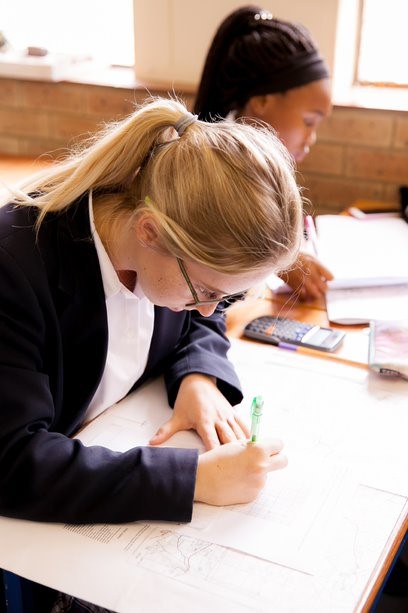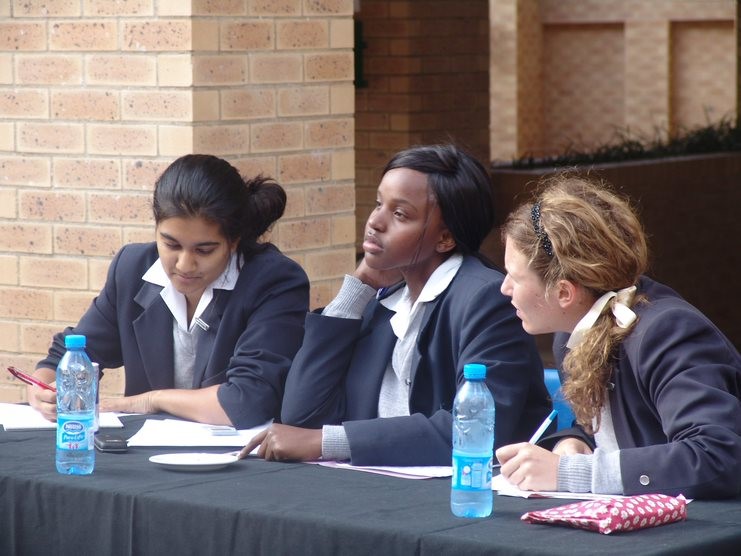Learn
Academic Philosophy


St Stithians Girls’ College aims to educate individuals to be lifelong learners who participate, lead and serve. We are committed to developing well-rounded individuals, prepared to inspire excellence and make a difference in South Africa, the African continent and globally. Our focus combines tradition with innovation, and academic ambition with a diverse and holistic curriculum, enabling students and staff to grow and develop to their best potential.
ACADEMIC EXCELLENCE
St Girls’ College has a history of academic excellence with our Grade 12 results being consistently exemplary throughout our history. Our school is competitive amoungst the top girls’ schools in the country. On our staff we have experienced and leading teachers, with many of our staff being selected as IEB examiners, moderators and curriculum specialists. Academics is our core business and we expect our students to give of their very best applying themselves and working to their individual strengths. Our learning programme at the Girls’ College is rigorous, where we aim to mould independent students who take responsibility for their learning and are accountable for their decisions and actions. We offer a open-minded approach to education where our students are challenged to think, to be creative and to be solution focused. The vision of educational excellence includes being a College with inclusive and differentiated practices, offering a wide spectrum of experiences which optimise personal learning.
The Girls’ College has four faculties as follows:
- Commerce and Technology
- Humanities and Arts
- Languages
- Mathematics and Science
Each of the faculty areas is overseen by a Faculty Director who is responsible for the academic programme, innovation and development of subjects within the faculty area.
We have a Director of Academic administration who is responsible for all academic management which includes our timetable, subject choice administration, examinations and communication with the IEB.
ACADEMIC SUPPORT
The College acknowledges that every student is unique, with individual strengths, challenges, interests, abilities, and learning needs. Academic and or/ learning support refers to student support services which address learning and teaching and aim to meet the educational needs of students.
At the Girls’ College our Academic Support team comprises of 2 members of staff with an emphasis on the following core areas:
- Academic concessions and learning needs
- Language and literacy
- Mathematics
- Organisation and study skills
The Girls’ College can accommodate around 10 students per grade with particular learning support needs. During the admissions process, our Director of Academic Support will meet with parents and the student concerned. Careful analysis of existing educational assessments and the student’s academic history will be examined as a part of the admissions process to ensure we are able to best assist and support the student in our academic programme.
TIMETABLE AND CURRICULUM
We currently run an 11-day cyclical timetable, with the school day commencing at 07:25 and lessons officially ending at 14:15 each day, except for Wednesday when we close early at 13:20. Lessons are 50 minutes in length (except on Wednesday), with the school day consisting of around 6 lessons a day together with time devoted to leadership, pastoral care and gathering times such as Chapel and assemblies.
GRADE 8 AND 9: GET PHASE
Our Grade 8 and 9 curriculum has been especially designed for a real and relevant learning experience and is unique to the Girls’ College. The learning programme in these years is tailored to the adolescent girl with unique courses including: S4W “Space for Wellbeing” where our students focus in their personal wellbeing and development of core social and emotional skills required to navigate our increasingly complex and competitive world. We offer 1 period a Cycle of “Safe Harbour” which is a programme that develops cognitive skills During Grade 9, our students venture off to our Kamoka Bush School for 3 weeks where they are immersed into an experiential learning programme with a focus on environmental education and practices associated with sustainable living.
GRADE 10-12: FET PHASE
The FET phase follows the IEB curriculum as students start to focus and ultimately prepare for their final Matric certificate. Students are required to take 7 subjects from Grade 10 onwards. Compulsory subjects include: English Home Language, a second additional language, we offer Afrikaans, isiZulu or SeSotho, Mathematics or Mathematical Literacy and Life Orientation. A further 3 subjects are selected based on student interest and capability. Currently the subject offering at the Girls’ College is as follows:
- Accounting
- Business Studies
- Computer Applications Technology
- Dramatic Arts
- French
- Geography
- History
- Information technology
- Life Sciences
- Music
- Physical Science
- Sports Science
- Visual Arts
We endeavour to accommodate all our students’ subject selections but this is not always possible because of timetabling and logistic constraints. Certain subjects have entrance requirements for students to be allowed to take them in the FET phase. All of the above subjects are designated subjects and are fully accepted by universities both locally and globally.
ACADEMIC EXTENSION
For our academically talented students, we offer Further Studies in English and Mathematics. These can be taken as additional subjects. These subjects are benched marked internationally and are equivalent to an A-level qualification.
Students are able to take an additional 8th subject, however, this does add significantly to a student’s load and is only recommended for academically strong candidates who have sufficient capacity in their weekly programme to take on further study. Additional subjects occur outside of the timetable and are at extra cost. In the majority of cases, parents will need to seek a specialist tutor, particularly when the subject is not formally offered in our programme, for example Mandarin, Spanish and Economics as examples.
EXTRA LESSONS
From Tuesdays to Thursdays all our academic staff are available from 14:15-15:00 for academic consultation. In this time students can meet with a teacher on a one-one basis for support and assistance. In addition, small group sessions are also provided on a need’s basis. We offer a full extra lesson programme in mathematics and our various language areas at no extra cost.
ACADEMIC AWARDS
Academic awards are celebrated annually, in January of each year as we look to the academic year that was. Students are eligible for certificates of excellence in each of their subject areas. We announce the Dux scholar for each grade at this ceremony. Students in Grade 11 and 12 are eligible for academic colours and honours awards, which are based on cumulative achievement over a student’s high school journey.
TECHNOLOGY AND 21ST LEARNING
Grade 8 and 9 students are required to have a tablet device, preferably an Apple iPad since this device is most stable on our system. Microsoft Teams is our preferred learning management system. Resources and learning material are provided on Teams for download, whilst many subject areas also require students to submit homework assessments via this online learning platform. From Grade 10 upwards many of our students use laptop devices in lessons, or a combination of laptop and tablet, this is at the discretion of the student.
Grade 8 and 9 students take Technology and Coding and Robotics as subjects which includes ICT related learning including an introduction to coding and robotics. Technology lessons also factor in learning linked to design thinking practices and elements associated with robotics. Students with a particular flair for robotics and coding are encouraged to join our robotics club and consider taking information technology as a Matric subject which has a particular emphasis on coding.
Careers and the future beyond school
Career development is a journey that must be navigated throughout life. We live in a world of accelerating change; a report by the World Economic Forum reveals that almost 65% of the jobs primary school students will be doing in the future do not even exist yet (Raya Bidshahri, July 04, 2017 in an article titled 7 Critical Skills for the Jobs of the Future). In light of this, we provide career development support that aims to empower and equip our students to know themselves, their strengths, talents, and preferences, in order to make well-informed career-related decisions in an ever-changing world.
Our fulltime psychometrist facilitates a comprehensive career development workshop with the Grade 9s each year, which focuses on discovering unique interests and strengths. Additionally, tertiary course information and requirements are provided within this programme as far as possible, to assist with subject choices for Grade 10, 11 and 12. We also have local universities visiting us in the first term to share relevant information and answer any questions that students or parents may have.
Full career development assessments are offered annually to Grade 11 and 12 students. Our “Career Speed Dating” event takes place in the third term each year, and this is where our Grade 11 students have the opportunity to meet and network with professionals from various fields of work, explore options and gather information. The feedback after the event has been overwhelmingly positive and students generally find this to be quite significant in their career development journey.
Throughout the year, students and their parents are welcome to book individual consultations and assistance with our psychometrist, and any pertinent information relating to tertiary studies or career fields is placed in the weekly newsletter through the “Career Corner” news – including articles, scholarship information and important dates.
The IEB Matric NSC Qualification
The IEB Matric qualification is accepted internationally. While we encourage our students to study their undergraduate degrees in South Africa, we are increasingly seeing more students exploring tertiary opportunities further afield. Our students fare exceptionally well at overseas universities, with many being offered top scholarships. Our students have gained acceptance into universities in the US, Europe, the UK and Asia, including the Ivy league institutions. Our careers centre will guide students on this pathway and assist students with their various application processes, both local and foreign.






